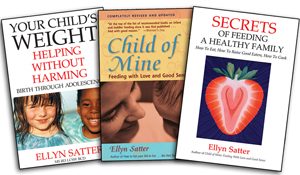

Family Meals Focus
The Ellyn Satter Institute Newsletter
Toddler feeding: what’s the big deal?
by Ellyn Satter, Family Therapist and Registered Dietitian
Eating and feeding problems in older children, adolescents, and adults represent missed opportunities in gaining eating competence, often from the toddler period. To get feeding on the right track with the toddler, follow the division of responsibility: do the what, when, and where of feeding and let your child do the how much and whether of eating. Then keep feeding on the right track by following Satter’s division of responsibility in feeding (sDOR) in a stage-appropriate fashion throughout your child’s growing up years.
Families have trouble with feeding
Think about it. Do you have families in your practice for whom family dinners are battlegrounds between parents and children? Parents who cook two or three meals in order to please all the eaters at the table? Parents who have given up on family meals altogether because they are so unsatisfying? Do you work with children who are afraid to sleep over with friends because they aren’t sure they can eat the food there? With parents who hesitate to let their child sleep over because they know he will stuff himself on all the food he isn’t allowed to eat at home? Do you work with or know personally an extremely finicky adolescent or adult? One who is essentially a dietary cripple? One who feels guilty and anxious about eating and weight?
Parents have much to learn about feeding
Eating and feeding problems in older children, adolescents, and adults represent missed opportunities, often from the toddler period.
Growing children present lots of surprises and challenges with feeding, and give their parents many opportunities for growth.
- Parents learn that meals are for them and that their child is being invited to join in.
- Feeding is similar to other issues in growing up: with taking responsibility comes privileges. Older children watch advertisements, eat at friends’ homes, become opinionated about what they want to eat, and want to dictate the family menu. When the child does a good job with food acceptance, he can have the privilege of suggesting part of the family menu. That is quite different from catering the menu to get a picky kid to eat.
- Read ”moves and countermoves” starting on page 365 in the Toddler chapter of Child of Mine: Feeding with Love and Good Sense.
- Parents learn that maintaining a division of responsibility in feeding is still necessary, even though their preschooler’s new capability and compliance can lull them into feeling it is no longer important. The bottom line is that parents are important. Review the Preschooler chapter in Child of Mine.
- Parents resist being sold a bill of goods by a child who acts independent, thinks he knows it all and seemingly values friends more than family. They hang in there with family meals, with expecting their child to show up for meals, and with expecting pleasant mealtime behavior. Read the School-age Child chapter in Your Child’s Weight: Helping Without Harming.
- Parents learn that meals are about family. They realize how important family support is for the adolescent preoccupied with making it with his friends and, soon, making it on his own in the outside world. Read the Adolescent chapter in Your Child’s Weight: Helping Without Harming.
- For more with managing family meals, see Secrets of Feeding a Healthy Family.
Explore
Understand your child throughout the growing-up years. Read about stage-related feeding in Child of Mine: Feeding with Love and Good Sense and Your Child's Weight: Helping Without Harming. For help with managing family meals, read Secrets of Feeding a Healthy Family. Buy all three books for a discounted price!

